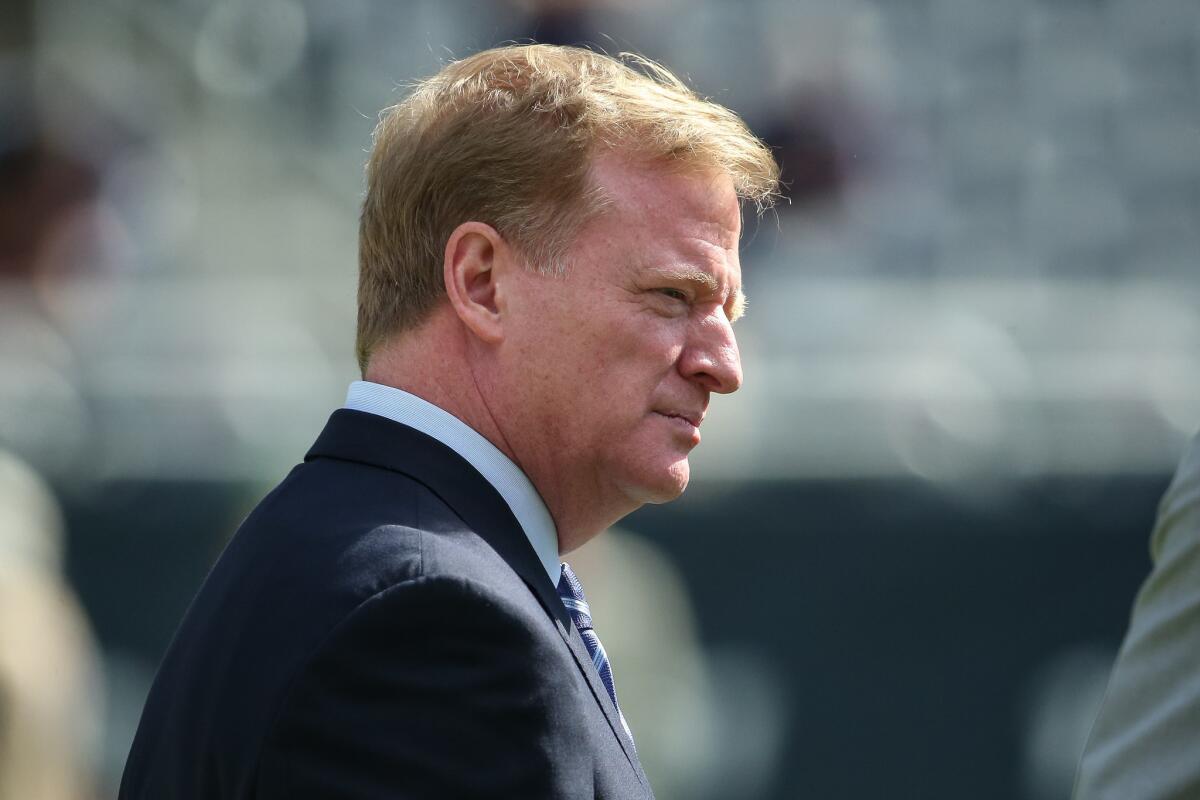Roger Goodell, six owners taking more prominent role in NFL’s potential return to L.A.

NFL Commissioner Roger Goodell stands on the field prior to a game between the Bears and Packers.
- Share via
The NFL’s potential return to Los Angeles has quietly entered a new phase.
For two decades, the process has been controlled by league executives and staff. They have done the analyzing, the comparing, the haggling. They have set the tempo of discussions.
Now, with the St. Louis Rams, San Diego Chargers and Oakland Raiders eyeing a move before the 2016 season, team owners are taking control of the process.
The Committee on Los Angeles Opportunities, comprising six owners, along with Commissioner Roger Goodell, will take a more prominent role in the proceedings in the next few weeks. This has not happened since the Raiders and Rams left the L.A. market 20 years ago.
In the coming weeks, people such as NFL Executive Vice President Eric Grubman, for months the point man on L.A., will step into the background and defer to Goodell and the committee, which is chaired by Pittsburgh Steelers owner Art Rooney II, and includes New England’s Robert Kraft, Carolina’s Jerry Richardson, Kansas City’s Clark Hunt, Houston’s Bob McNair, and the New York Giants’ John Mara.
It’s no coincidence that influential group includes the chairmen of the Stadium Committee (Rooney), Broadcast Committee (Kraft), Finance Committee (McNair), International Committee (Hunt), and Management Council (Mara).
On the surface, this might seem like a subtle change — and it might be. The process has been glacial, and the situation hasn’t changed much since the spring, when the Chargers and Raiders got the necessary entitlements on their joint project in Carson to pull even with the Rams in Inglewood.
But, with the league heading into its fall meetings in New York in the second week of October, this could represent a major shift. The owners are the ultimate decision makers and may choose to nudge the L.A. situation along by making some actual decisions.
NEWSLETTER: Get the day’s top headlines from Times Editor Davan Maharaj >>
They could make a firm commitment to a temporary site or sites – although the Coliseum is officially the only game in town at this point – or move up the window for submitting relocation applications. That currently opens at the beginning of 2016, but the league has talked about opening it earlier to give a team or teams more time to get up and rolling in L.A.
Most significantly, those owners could tip their hand as to which project they prefer. So far, they have not taken an official position on that. When they do, it could be the start of a real relocation.
Up to now, if Grubman or staff leaned one way or another, it didn’t have the weight of an owner expressing a preference.
Goodell’s role is pivotal too. He knows Southern California, because he was in Grubman’s role, the point man for bringing a team back to L.A. in the late 1990s, when Paul Tagliabue was commissioner.
Although it’s unlikely Goodell would go against the recommendation of an L.A. committee he appointed, it’s also safe to assume he has some ability to influence and shape the opinion that comes out of that room.
Both the Rams and the Chargers/Raiders believe they have the superior plan. But nobody knows for sure what those six committee members think, or what they will eventually decide.
So which of the two plans, Inglewood or Carson, benefits most from this shift to the owners?
That’s where the tea-leaf reading comes in.
The Rams think they have the better project and location, and the deeper pockets and L.A. roots.
The Chargers and Raiders are confident they have the support of most NFL owners – San Diego’s Dean Spanos is especially popular among his peers – and, not surprisingly, those two teams prefer their plan, location, and the fact theirs would be an outdoor stadium with real grass.
What we know for sure is the people who can actually vote on a decision are stepping forward and taking control, something that had not happened up to this point. And that just might be progress.
Twitter: @LATimesfarmer
ALSO
Deadline passes to put San Diego stadium-financing measure on January ballot
San Diego, St. Louis stadium representatives won’t present at NFL meetings
More to Read
Go beyond the scoreboard
Get the latest on L.A.'s teams in the daily Sports Report newsletter.
You may occasionally receive promotional content from the Los Angeles Times.











